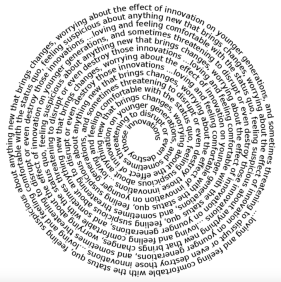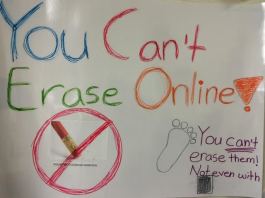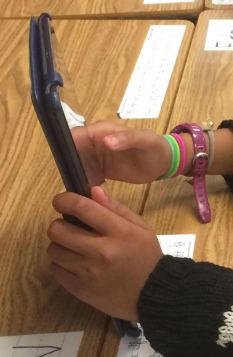 If on occasion, you become concerned about how your child handles stressful learning situations, read this insightful article, Daydreaming is Good for You, and Other Things I Want Kids to Know About their Brains. The writer describes a range of brain capabilities, explaining how they can support young learners. Growing children need to understand how these basic neurological brain features can help them become stronger, confident, and more effective learners. Continue reading “What We Want Kids to Know About How the Brain Learns”
If on occasion, you become concerned about how your child handles stressful learning situations, read this insightful article, Daydreaming is Good for You, and Other Things I Want Kids to Know About their Brains. The writer describes a range of brain capabilities, explaining how they can support young learners. Growing children need to understand how these basic neurological brain features can help them become stronger, confident, and more effective learners. Continue reading “What We Want Kids to Know About How the Brain Learns”
Category: digital parenting
Learn Lots More from the New York Times About Addressing Kids’ Tech Use
 After nine years of blogging at MediaTechParenting, I’ve written posts about kids, technology, parenting, screen time, citizenship, 21st Century life, digital devices — well you get the idea. Now a New York Times Smarter Living published report summarizes a good deal of what I’ve been writing about in a parents’ guide to raising and guiding kids in the digital world.
After nine years of blogging at MediaTechParenting, I’ve written posts about kids, technology, parenting, screen time, citizenship, 21st Century life, digital devices — well you get the idea. Now a New York Times Smarter Living published report summarizes a good deal of what I’ve been writing about in a parents’ guide to raising and guiding kids in the digital world.
How (and When) to Limit Kids’ Tech Use by Melanie Pinola (@MelaniePinola) includes just about everything a digital age parent needs to know. The comprehensive and well-packaged guide overflows with information. Keep it nearby, whether your child is a new baby, a teenager, or any age in between.
Pinola breaks her digital parenting guide into three parts: Continue reading “Learn Lots More from the New York Times About Addressing Kids’ Tech Use”
Maybe Technology Itself Is Not the Primary Cause of Adolescent Digital Problems?
I’ve just finished reading a June 3, 2019 New York Times article, When Social Media is Really Problematic for Adolescents, by pediatrician Perri Klass and published for  her New York Times Check-up column. It’s an engaging read for parents of digital kids and for educators. (Check out other New York Times articles by Perri Klass.)
her New York Times Check-up column. It’s an engaging read for parents of digital kids and for educators. (Check out other New York Times articles by Perri Klass.)
Dr. Klass makes a strong case for using a new paradigm when we consider the 21st Century digital world challenges of preteens and adolescents. She writes that technology activities such as gaming and social media may not be the primary cause of problems such as cyberbullying, addiction, or suicide, but rather interactive factors that further complicate the existing social-emotional and psychiatric problems of many young people.
Continue reading “Maybe Technology Itself Is Not the Primary Cause of Adolescent Digital Problems?”
Panic & Fear About Technology — Especially Social Media
 Do you find yourself nervous and at wits end about all the problems with social media and kids? Do you dread hearing the next news report about kids, screens, and digital addiction because it feels too close to home? Are you regularly worried about the intensity of your own digital activities?
Do you find yourself nervous and at wits end about all the problems with social media and kids? Do you dread hearing the next news report about kids, screens, and digital addiction because it feels too close to home? Are you regularly worried about the intensity of your own digital activities?
Few people will argue with the notion that our digital world needs tweaking. With data collecting running amock, hackers breaking into corporations around the world, bad actors using social media for espionage, parents’ worrying about screen time, and our personal privacy and information challenged day in and day out, people tend to panic about their kids and themselves. But panic is nothing new. Continue reading “Panic & Fear About Technology — Especially Social Media”
Those Digital Footprints Keep Multiplying

For years, when I taught seminars in digital citizenship to third, fourth, and fifth graders, the primary topic was always digital footprints. Oh, we discussed and worked on lots of other 21st Century connected-world issues, civility, for instance, but everything seemed to wend its way back to those always-proliferating digital footprints.
We watched and rewatched my favorite digital dossier video from the Berkman Klein Center at Harvard. The students kept diaries and also asked their parents to do so. They found an online calculator to explore and considered how their permanent digital footprints might look a few years down the road. We made a list of all the potential places that might collect digital footprints, one year creating a list that started at the ceiling, went all the way to the floor and then back up to the ceiling again.
My students were always amazed at the size of their digital dossiers which included, in addition to email, apps, social media, and websites, a range of digital markings that they never considered such as credit cards, license plates, grocery store purchases, EZ pass travel, Amazon purchases, app downloads, and so much more. So when the time came for a final project — more than half or each fifth-grade class chose to concentrate on a digital footprint topic. Two of their posters are shared here. Continue reading “Those Digital Footprints Keep Multiplying”
Five Articles About the Apple Parental Control App Controversy
The thing is, I love Apple. I’ve owned various Apple computers since 1984 and iPhones for almost ten years. Not to mention various other items like iPods and IPads. But once in a while, I find the policies in the App Store to be dispiriting. Now is one of those times.
 As a specialist in 21st Century educational technology and media literacy, I’ve often helped parents select a parental control app that is right for each family. Lots of these apps are out there, and they allow adults to ensure that their children are not misusing their mobile devices
As a specialist in 21st Century educational technology and media literacy, I’ve often helped parents select a parental control app that is right for each family. Lots of these apps are out there, and they allow adults to ensure that their children are not misusing their mobile devices
Many of these parents realized the need for these apps, bought them — and used them — early on. Digital parenting is challenging, many of these parents took their responsibilities seriously, and the companies that enabled these good decisions should also be taken seriously.
Frankly, when it comes to monitoring screen time, Apple came late to the party. Continue reading “Five Articles About the Apple Parental Control App Controversy”
Online Security and Passwords… Passwords… Passwords

WHDH television news in Boston reported on a United Kingdom survey conducted by the National Cyber Security Centre (NCSC). The data were gathered via telephone polling, and the overall aim was to learn more about how people in Great Britain think about online security, what they worry about, how they learn more, and how they maintain personal security online. Check out the results depicted in a set of amazing charts and graphs.
My guess is that the results would be somewhat similar in the United States.
Also described in the WHDH article was another part of the study in which NCSC researchers conducted password “breach analysis” using information gathered from the website Have I Been Pwned? This website allows individuals from all over the world to type in their email addresses and receive immediate feedback about whether any of their accounts were hacked (or breached). Because the site keeps track of huge data incursions from around the world, it has accumulated massive password data. Note: I have used the site twice and discovered a violated account resulting from a corporate data breach, something that exposed the credit information of millions of people. Continue reading “Online Security and Passwords… Passwords… Passwords”

You must be logged in to post a comment.